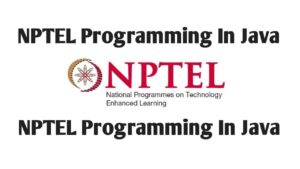Nptel Programming in Java Week 4 Assignment Answers
Nptel Programming in Java Week 4 Assignment Answers
Searching for the Week 4 answers of the NPTEL “Programming in Java” course? You’re in the right spot! Here, you’ll find reliable and up-to-date solutions to help you complete your Week 4 assignment with confidence.

Programming In Java
With the growth of Information and Communication Technology, there is a need to develop large and complex software. Further, those software should be platform independent, Internet enabled, easy to modify, secure, and robust. To meet this requirement object-oriented paradigm has been developed and based on this paradigm the Java programming language emerges as the best programming environment. Now, Java programming language is being used for mobile programming, Internet programming, and many other applications compatible to distributed systems. This course aims to cover the essential topics of Java programming so that the participants can improve their skills to cope with the current demand of IT industries and solve many problems in their own filed of studies.
PREREQUISITES : This course requires that the students are familiar with programming language such as C/C++ and data structures, algorithms.
INDUSTRY SUPPORT : All IT companies.
COURSE LAYOUT – Click To Know More
Nptel Programming in Java Week 4 Assignment Answers
Q1. Which access modifier allows a method to be accessible within the same package but not from outside the package?
a) default
b) private
c) public
d) protected
Q2. What will happen if you attempt to access a private method from another class in Java?
a) The method will be accessible.
b) The method will throw an exception.
c) The method will be inaccessible.
d) The method will be converted to protected.
Q3. What will be the output of the following code?
class Person {
public Person() {
System.out.println(a + b + " Java");
}
}
class Employee extends Person {
public Employee() {
System.out.println(a * b + " Java");
}
}
public class Question {
public static void main(String args[]) {
Person p = new Employee();
}
}
a) 1Java 10Java
b) 1Java 0Java
c) 10Java 0Java
d) 1Java1 0Java0
Q4. Which of the following is a built-in Java package?
a) java.util
b) my.package.util
c) default.package
d) system.java
For Latest Update Join our official channel: Click here to join
Q5. What keyword is used to define a package in Java?
a) define
b) package
c) import
d) namespace
Q6. How do you import a specific class from a package in Java?
a) import package.*;
b) import package.ClassName;
c) include package.ClassName;
d) use package.ClassName;
Q7. Consider the following program:
class Base {
public void print() {
System.out.println("Base class...");
}
}
class Derived extends Base {
public void print() {
System.out.println("Derived class...");
}
}
public class Main {
private static void main(String[] args) {
Base b = new Base();
b.print();
Derived d = new Derived();
d.print();
}
}
How many errors does this program contain?
a) None
b) 1
c) 2
d) 3
Q8. Which of the following is true about Java interfaces?
a) They cannot contain method implementations.
b) An interface can extend multiple classes.
c) An interface can only contain abstract methods.
d) They allow a class to achieve multiple inheritance.
For Latest Update Join our official channel: Click here to join
Q9. What will happen if you do not specify an access modifier for a class in a package?
a) The class will be ‘private’ by default.
b) The class will be ‘protected’ by default.
c) The class will be accessible only within the same package.
d) The class will be ‘public’ by default.
Q10. Which access modifier provides the most restrictive access in Java?
a) default
b) protected
c) private
d) public
Nptel Programming in Java Week 5 Assignment Answers – Click Here